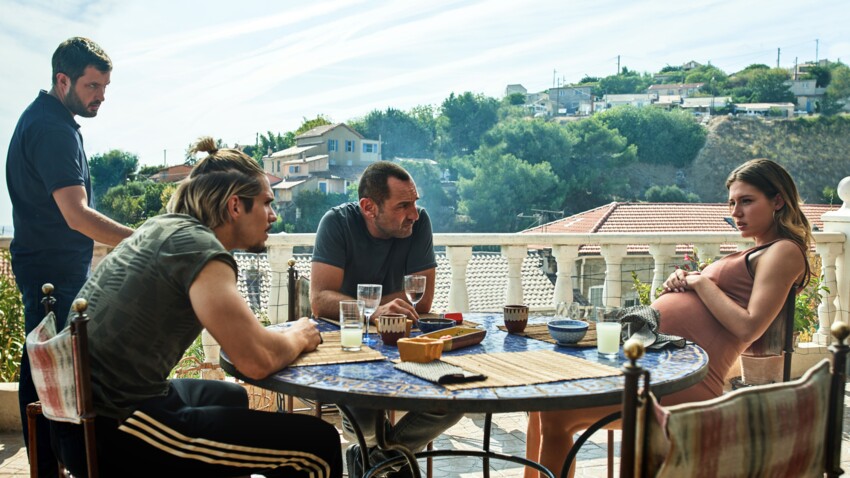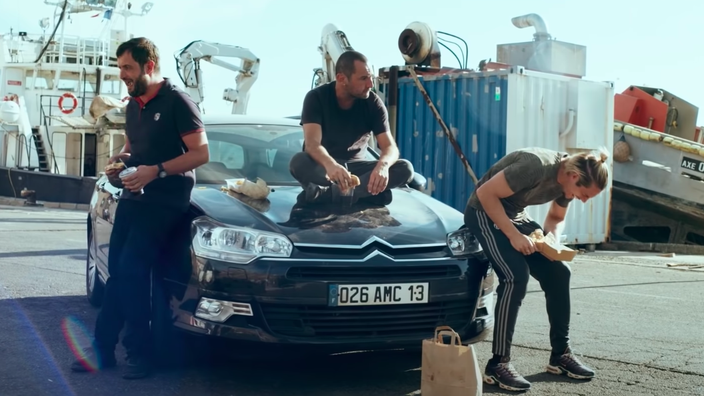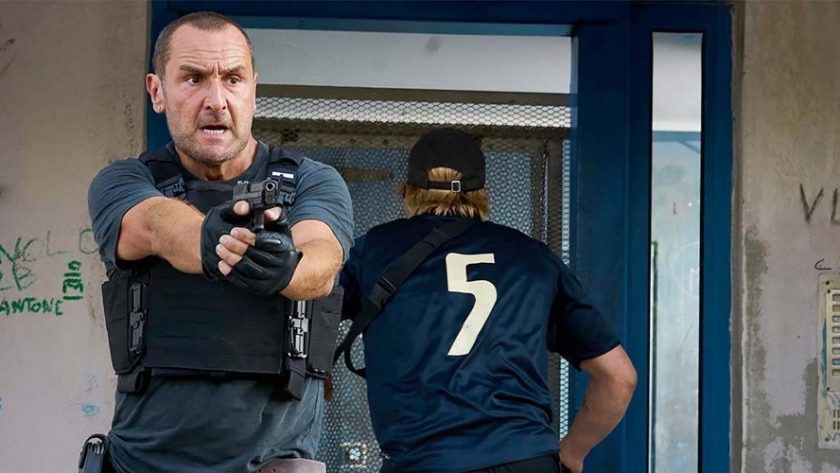Thomas Delorme reviews a french crime drama about three Marseille cops getting a chance to bust a major drug network.
The idealistic panorama commonly associated with Marseille, a city of Mediterranean diversity, home to the most passionate of football teams, tends to overshadow a very different reality: that of the “Quartiers Nords”. These are Marseille’s northern estates, lawless areas where violence is the rule, and in which murderous drug traffickers call the shots. Well, not quite. As the police adapts to this new threat, they adopt brutal and illegal methods, sometimes to deal with crime, other times to commit crimes themselves. In 2012, in an all-time low for French law enforcement, the French Prime minister disbanded this controversial unit as the judiciary started its prosecution.
Nine years later, Cedric Jimenez’ Bac Nord (The Stronghold on Netflix), that precisely treats the nexus between the lawlessness of Marseille’s northern estates and the questionable response from the police officers, was released to cinemas. As fate would have it, due to Covid related delays, this coincided perfectly with the delivery of the first verdicts of this case that had been at the forefront of national news, and by which the events of Bac Nord are largely inspired. Coincidentally, most of the members of the Bac were exonerated by the law and by The Stronghold, as Cedric Jimenez chooses to screen the story from the point of view of three passionate yet rogue cops – yet again, going against what is commonly offered to the public by cineastes.

French cinema has a history of tackling head-on the issue of confrontation between marginalised estates and the police, seen as a systemic enemy of the inhabitants of these areas, commonly associated with drug trafficking. In 1995, in the wake of mass protests against police brutality, Matthieu Kassowitz released the amazing La Haine and in 2019, Les Misérables by Ladj Ly took its audience aback (including Emmanuel Macron) through its vivid depiction of the tension and violence found in Parisian estates. However, Cedric Jimenez, a first-hand witness of the difficulties associated with living in Marseille’s northern districts, having grown up there, decides to depict the gruelling, tiresome and sometimes humiliating reality of what it is to work as a member of the police in these areas – thus venturing along a true tightrope in a social and political context where showing any support to the police can be seen as a discreditation of those who have suffered the hardship of police brutality. In order to understand how he precisely does this, it is probably best to delve into the specifics of the film.
Perhaps Bac Nord can best be analysed as a three-part play. Respecting tradition, the opening scene introduces the three members of Marseille’s northern police force– Gregory, the psychologically worn out yet charismatic leader who has dedicated his life to the force and has sacrificed his personal relationships by doing so, Yassine, the anxious yet ambitious father to be and Antoine, the newest member of the gang, dauntless and daring. These characters are never meant to be idealised by the public and are all inherently flawed, which both makes them endearing without ever erasing all doubt in the audience’s mind that they may be ready to cross a line in order to obtain results. They seem to represent a panorama of what constitutes the police force, a mixture of an old-school sense of justice, a vector of social mobility and simply a passionate and action-packed job in a country where over 90% of the population works behind a desk.
This improbable trio roam the streets of Marseille, looking for delinquents to apprehend and quench their thirst for action. However, what resonates is a sense of powerlessness concerning the worst of the Marseille crime scene. In effect, they are unable and prohibited by their own superiors from venturing into the northern districts, a lawless area in which the State has been effectively replaced by an army of traffickers and where violence has become the rule. This shocking reality, often evoked by the media, is effectively and distressingly exposed by Cedric Jimenez, a native of these estates. In Bac Nord, it is only when this violence reaches the public eye, through a scene seemingly filmed on Snapchat where a teenager is savagely beaten and where the police institution is openly provoked on social media, that a riposte is envisaged. This leads us to the crux that follows our theatre analogy, the moment where drastic actions become necessary to rescue a seemingly irrecuperable and desperate situation.

The three cowboys of what has been called an “urban western”, due to the lawlessness of their immediate environment and their dangerous methods, are given the opportunity to venture into this violent abyss when their politically motivated superiors give them an apparent “carte blanche” to skirt the rules and obtain decisive results. From the crux of the narrative, where they were helpless, appears a new hope, a wave of optimism and determination in which, through contestable methods, the protagonists become the unlikely heroes of the State’s response to violent organised crime. Incredible scenes of drama and tension unravel as the whole Marseille’s police-force descend on one of the Northern district’s estates. Hundreds of residents were used as extras, some of them potentially calling on their own encounters with the police, and enact this intense large-scale showdown between organised crime and the police. What truly makes this scene the culminating moment of the film and a grand moment of cinema is the unbearable and excruciating tension that the audience goes through, as a tragic possibility always seems to be verging on becoming reality. Cedric Jimenez’ leitmotiv in all his films is that the camera must follow the actors and it isn’t the actors that must act for the camera. The results in these action scenes are at their most satisfying as the artists are granted complete freedom, contributing to making them the most realistic and enticing to the audience.
Far from signifying the end of the film, the summit of glory attained thanks to the success of the operation only marks a sharper contrast with how far they fall afterwards. Betrayed and abandoned by their superiors, the trio face allegations regarding their conduct and are temporarily incarcerated – destroying everything they thought the police stood for. It is perhaps this last act that has contributed to spark controversy around the film’s release in France, last August. At the Cannes Festival, a journalist asked Cedric Jimenez if he thought that Bac Nord might not contribute to the rise of Extreme Right parties in France, who tend to pry on feelings of insecurity and raise compassion towards police officers who are constantly faced with disrespect and violence, yet are reprimanded whenever they skirt the rules ever so slightly. The director assured that far from being the message of his film, the choice of adopting the point of view of these police officers was to represent a version of violence of the northern estates that is never told. A couple of weeks later, Marine Le Pen, president of the National Front, tweeted the cover of the film with the accompanying message: “Soutien aux flics de France.” (Support for French cops) Unwittingly, Jimenez had aided the cause of the extreme right by losing control of his own work, not by his own fault, but by those who simplify messages and realities in order to further their own cause.
Watch the trailer for BAC NORD here:




